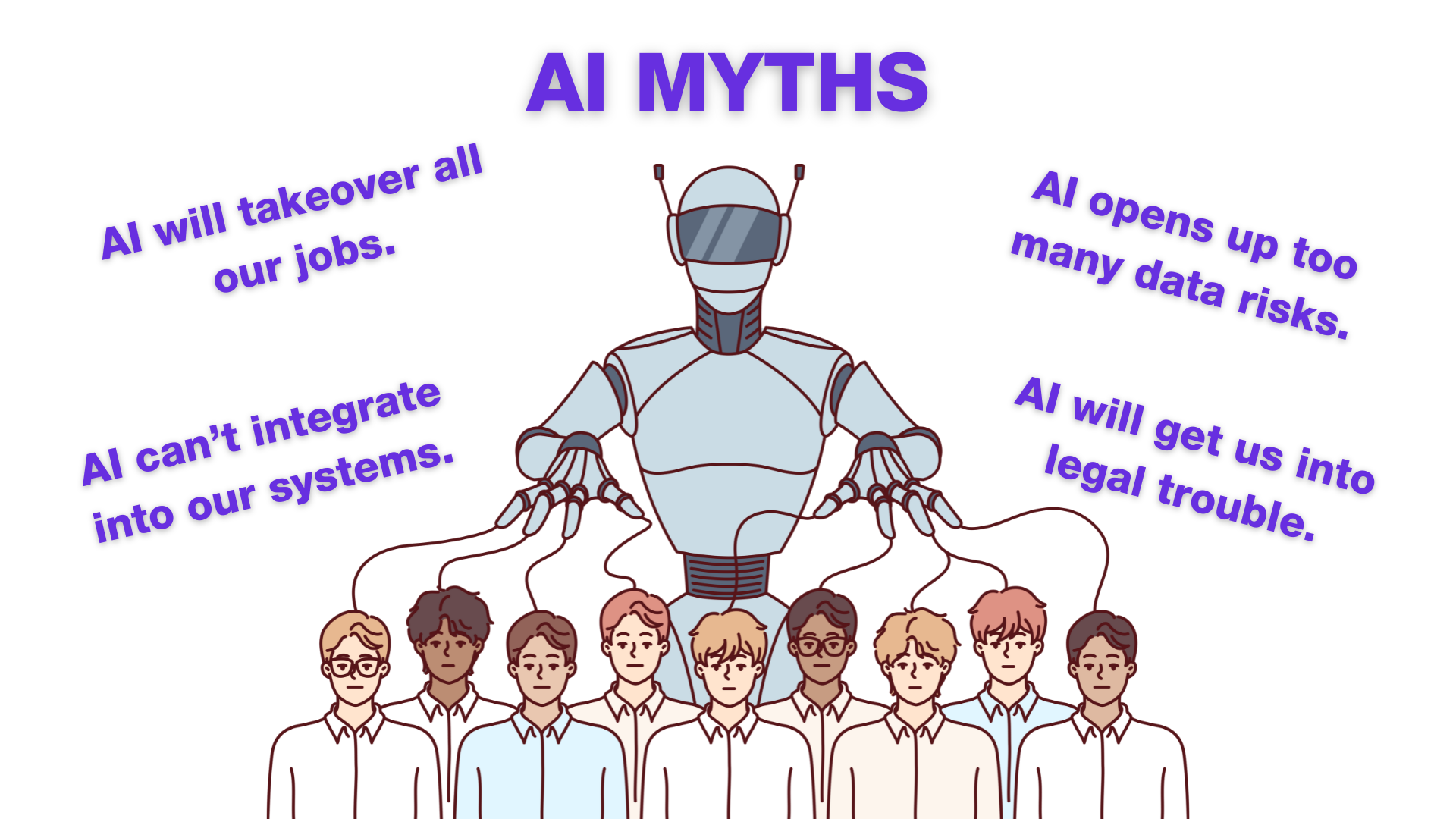🎣 Freight vs. Tariffs
Plus, two trucking firms close, harassment claims at TIA conference, a 19.5% week-over-week drop in spot loads, and more.
The myths, the reality, and practical tips for how you can begin using AI in your freight business.


Myth 1: AI Will Replace Entire Jobs
Reality: AI isn’t here to steal your job; it’s here to make it easier. Think of it like a co-pilot. Levity takes over those repetitive, mind-numbing tasks like email sorting, responding to routine inquiries like spot quote requests, and sending tracking updates, giving freight brokers more time to focus on relationship-building and strategic decision-making. Human expertise remains irreplaceable, especially when dealing with complex scenarios.
Myth 2: AI Will Make Mistakes and Cause More Problems
Reality: While no system is perfect, well-designed AI tools are built to enhance accuracy and minimize errors. These tools help ensure that emails don’t slip through the cracks and continuously improve by learning from your business’s workflows. However, AI isn’t meant to operate in isolation—it works best in symbiosis with human oversight. By combining the efficiency of AI with human expertise, brokers can catch any nuances or complex issues that require a human touch. By starting with low-risk tasks, brokers can build confidence in AI’s reliability while maintaining control. The key is to train the system gradually, allowing it to adapt to specific operational needs while keeping critical tasks under human supervision.
Myth 3: AI Is Too Complicated for My Business
Reality: The idea that AI is only for freight giants is outdated. Modern AI tools are designed for simplicity and seamless integration. You don’t need a degree in computer science to implement AI in your business. Many tools offer user-friendly platforms that fit naturally into existing processes, automating the daily grind of email management without a steep learning curve or major system overhauls.
While the freight industry is built on relationships, the day-to-day workload can get bogged down by repetitive tasks. AI tools are here to lighten the load. By automating mundane tasks, freight brokers can shift their focus to what they do best: delivering value and building long-term partnerships. Here are some tangible benefits AI can bring to the table:

1. Improved Response Times: No one likes waiting on responses—especially in freight, where time is money. AI can handle routine queries and categorize incoming emails, making it easier to prioritize urgent customer requests. This means brokers can respond faster, keeping clients happy and improving overall efficiency.
2. Consistency in Follow-ups: Lost opportunities often happen when leads or customers slip through the cracks. With AI-driven automation, brokers can ensure consistent follow-ups on quote requests, client inquiries, and even overdue invoices. It keeps you top of mind with clients without adding to your workload.
3. Data-Driven Insights: AI doesn’t just automate—it learns. By analyzing the data from emails and other communications, AI tools provide deeper insights into client behavior, business trends, and operational patterns. For leadership, this translates into a valuable tool for making better, data-backed decisions. Whether it’s spotting inefficiencies, identifying new opportunities, or understanding customer preferences, AI gives decision-makers a clearer view of the business.
As with any new technology, adopting AI in freight operations comes with risks. However, with careful planning and understanding, these risks can be mitigated so that AI becomes a valuable tool rather than a source of frustration. Here are some common risks and how to manage them effectively:
1. "What if the AI doesn’t understand my client’s requests?"
AI may not always understand the nuances of client communications, leading to errors in task execution or responses.
Mitigation: Start small by automating simpler, low-risk workflows like email sorting or routine replies. As the AI system learns your business’s communication style, you can gradually increase its responsibilities. Remember to start with a system that keeps human oversight in place from the beginning so that any mistakes are caught early, and the AI can be adjusted and fine-tuned as it adapts.
2. "Will AI even work with the systems I already use?"
Integration issues are a big concern—freight brokers fear new AI tools won’t mesh with their existing TMS, CRM, or email systems, disrupting the workflow.
Mitigation: Choose AI tools that integrate with your freight tech stack. Many modern solutions are built to work with the systems brokers already use, reducing the risk of compatibility issues. Be sure to work with a solution that offers strong customer support to help troubleshoot any integration problems.
3. "Is my data safe with AI?"
Handling sensitive client data is part of the job, and brokers worry about potential data breaches or privacy issues with AI tools.
Mitigation: Make sure that any AI tools you consider comply with industry standards for data protection, such as SOC 2 guidelines, and use encryption to safeguard sensitive information. It’s crucial to choose a provider that prioritizes data security and is transparent about their protection policies.
4. "What if I rely too much on AI and mistakes slip through?"
There’s concern that relying too heavily on AI might reduce human oversight, allowing errors to go unnoticed.
Mitigation: AI should enhance human efforts, not replace them. Keep a human-in-the-loop approach using AI to handle repetitive, time-consuming tasks while leaving critical decision-making and relationship management to your team.
Integrating AI into your operations doesn’t need to be complicated. With the right solution, AI can seamlessly complement your existing workflow without overwhelming your team. Here are some practical steps to ensure a smooth transition:
1. Start with Low-Risk Tasks
Begin with simple, low-risk tasks that are repetitive but time-consuming, like sorting incoming emails, generating basic responses, or handling customer FAQs. This allows you to see quick wins and build confidence in AI before scaling up.
2. Monitor AI Performance Regularly
AI is not a “set it and forget it” tool—it needs to be monitored to ensure it’s working as expected. Regularly review its performance, especially during the early stages of adoption, and make adjustments as needed. Many AI tools allow you to train the system to better understand industry-specific terminology so you can fine-tune it to suit your business’s unique needs.
3. Keep a “Human-in-the-Loop” Approach
AI should be seen as a co-pilot, not a replacement for your team. While it’s great for automating repetitive tasks, your team’s expertise is still needed for complex decision-making and client relationship management. Always keep critical interactions—like rate negotiations and problem-solving—in human hands to maintain a personalized touch with your clients.
4. Choose Modular Solutions That You Can Shape to Fit Your Needs
As your business evolves, your AI solution should, too. Look for tools that allow you to shape workflows like building with Lego blocks, where you can start small and easily add or adjust modules as your needs grow. This flexibility ensures that your technology evolves alongside your operations without forcing you into a one-size-fits-all solution.
Now that we’ve explored how AI can enhance freight operations, let’s talk about a solution designed specifically for brokers like you.
Levity.ai offers a flexible, easy-to-use AI system that helps you automate your email workflows without overcomplicating your operations. Think of it like building with Lego blocks—you can shape the system to fit your exact needs, adding or adjusting features as your business grows.
Whether you’re looking to automate quote requests, send out shipment status updates, or ensure that no customer inquiry slips through the cracks, Levity has the tools to help you streamline your workflow. And the best part? It’s designed with freight brokers in mind, so it integrates seamlessly with the tools you’re already using.
The key is to make technology work for you, not against you. Tools like Levity are there to enhance your capabilities, freeing you up to focus on what really matters: growing your business and delivering top-notch service to your clients.
Ready to see how AI can elevate your operations? Schedule a demo with Levity today.
Join over 12K+ subscribers to get the latest freight news and entertainment directly in your inbox for free. Subscribe & be sure to check your inbox to confirm (and your spam folder just in case).